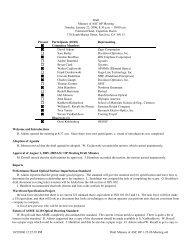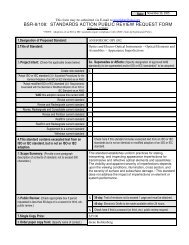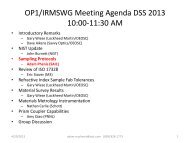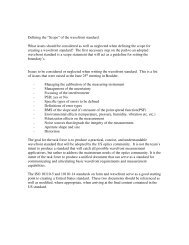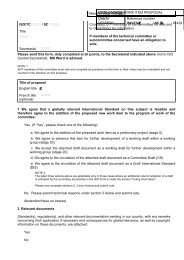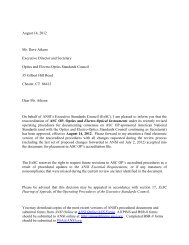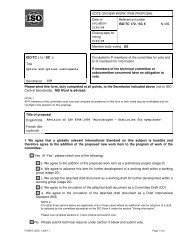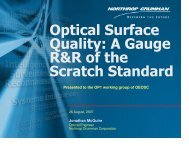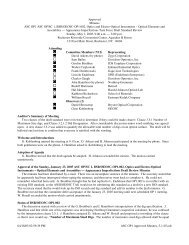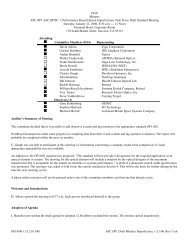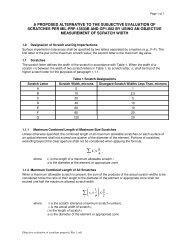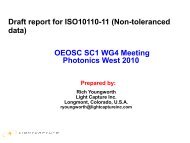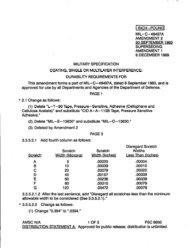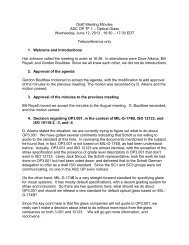INCH-POUND MIL-PRF-13830B 9 January 1997 SUPERSEDING ...
INCH-POUND MIL-PRF-13830B 9 January 1997 SUPERSEDING ...
INCH-POUND MIL-PRF-13830B 9 January 1997 SUPERSEDING ...
Create successful ePaper yourself
Turn your PDF publications into a flip-book with our unique Google optimized e-Paper software.
<strong>MIL</strong>-<strong>PRF</strong>-<strong>13830B</strong><br />
APPENDIX D<br />
been modified in any manner shall satisfactorily pass re-testing of the material in<br />
order to retain qualification approval. Qualification tests may be repeated on<br />
material previously found satisfactory at any time at the option of the activity<br />
responsible for qualification approval.<br />
D.4.5.2 Manufacturer’s data. Qualification samples shall be accompanied by a<br />
test report showing results of all tests required by this specification except the tests<br />
for bond strength, low temperature thermal stability and mechanical shock stability.<br />
D.4.5.3 Instruction sheet. Two copies of the manufacturer’s instructions for use<br />
of the adhesive shall be furnished with the qualification samples (see D.3.8).<br />
D.4.5.4 Tests. The qualification tests shall consist of all the tests of this<br />
specification.<br />
D.4.5.4.1 Normal temperature tensile shear test.. (Test No. 1 of Table ID)<br />
The test specimen shall be gripped tightly and uniformly across the ends of the jaws<br />
of the test machine with the jaws and specimen so aligned that the jaws are directly<br />
opposite each other, and in such a position that an imaginary straight line will pass<br />
through the center of the bonded area and through the points of suspension. All<br />
specimens shall be pulled at a jaw separation rate of 0.13 cm per minute. All failing<br />
loads shall be expressed in MPa of actual shear area, calculated to the nearest 0.65<br />
sq cm. A total of six specimens shall be tested. The average strengths of these six<br />
specimens shall equal or exceed that specified for test number 1 in Table ID. An<br />
average shear strength, less than that specified in Table ID, shall cause rejection of<br />
the adhesive.<br />
D.4.5.4.2 Elevated temperature tensile shear test. (Test No. 2 of Table ID)<br />
The 71° ± 2°C shear strength test shall be in accordance with D.4.5.4.1 with the<br />
added requirement that a suitable oven shall be provided to maintain the specimens<br />
at the specified test temperature (See D.4.3.3 and Table ID). Six specimens shall be<br />
tested for tensile shear test listed in Table ID. The average shear strength of each set<br />
of specimens tested shall equal or exceed that specified for Test No. 2 in Table ID. An<br />
average shear strength less than that specified in Table ID shall cause rejection of the<br />
adhesive.<br />
D.4.5.4.3 Low temperature tensile shear test. (Test No. 3 of Table ID) The low<br />
temperature tensile shear test shall be in accordance with D.4.5.4.1 with the added<br />
requirement that a suitable chamber shall be provided in maintaining the<br />
temperature at -51° ± 2°C (see D.4.3.4). Six specimens shall be tested for tensile<br />
shear strength at -51° ± 2°C. The average shear strength of test specimens shall<br />
61<br />
Source: http://www.assistdocs.com -- Downloaded: 2006-05-24T15:32Z<br />
Check the source to verify that this is the current version before use.



